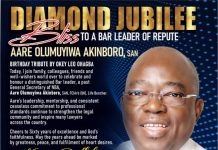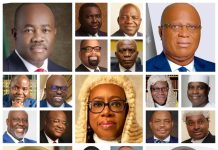“I had discovered since my appointment as a High Court judge that most of the politicians in Nigeria and, indeed, in other developing countries only pay lip-service to the independence of the judiciary…. It pays in the end for a judge, even at the risk of being a snob or of haughtiness, to be somewhat aloof, not only from members of the Executive, but also from political powerbrokers.”
Atanda Fatayi Williams, Faces, Cases and Places, pp. 77-78 (1983)
Atanda Fatayi Williams, the fourth Chief Justice of post-colonial Nigeria (CJN), has not always received the kind of credit that he probably should for a judicial career of impact. Few judicial careers in Nigerian history can compete with that of this grand-son of an Ijebu merchant in terms of both legacy and luminosity.
Sworn in as a judge a mere seven days after independence on 7 October 1960, Justice Fatayi Williams was the first person to be appointed a judge in post-independence Nigeria. 19 years later, he became Nigeria’s first Chief Justice of the presidential era. In this capacity, he was the first CJN to truly feel the pulse of the elected president as both head of state and head of government.
It was his good fortune that the president during his tenure as CJN was the emollient Alhaji Shehu Shagari but he saw enough to leave him a sceptic about judicial dalliance with politicians. “In Nigeria” he warned in his memoirs, “familiarity does not breed contempt. It breeds obligation…. people with whom you are friendly expect you to bend the rules to suit their requirements.”
As CJN, Fatayi Williams pioneered the All Nigeria Judges Conference in Ilorin, the capital of Kwara State, on 8 March 1982. That was one year after the current CJN became a lawyer. Shehu Shagari, then the president, traveled to Ilorin to address the conference. His presence and delivery bore the hallmarks of the polished modesty that defined Shagari’s long public service career.
The conference has grown since then to become a biennial tradition of the bench of Nigeria’s Superior Courts of Record. For many judges, the opportunity to mix, introspect, and learn together with colleagues from across the country, both serving and retired, is the highpoint of every judicial biennium. The conference is also an opportunity for judges as a collective to diagnose common problems that afflict the judicial branch, think together, and communicate with the other branches of government on policy matters adjacent or relevant to the judiciary.
For the past decade and a half, the conference has acquired a permanent home on the premises of the National Judicial Institute (NJI) in Abuja. This year’s conference began on 17 November at the same venue. The Administrator of the NJI, Babatunde Adejumo, himself a former President of the National Industrial Court of Nigeria, ran the floor under the direction of the Chair of the Institute who is also the CJN.
As befits a conference with the president of Nigeria in attendance, the opening of the conference was supposed to be brisk. The Administrator of the NJI had to be persuaded from lingering on the microphone with prolix protocol. Thereafter, it was the turn of the CJN.
Her delivery made a case that appeared both respectable and heartfelt, inviting her colleagues to defend and deepen democracy in Nigeria “by ensuring that justice is not only done but manifestly seen to be done in every courtroom, across every jurisdiction, and in every case.” With deftness, she acknowledged widespread notions that judicial decisions in Nigeria are “sometimes vulnerable to external influences”, a euphemism for perceptions of both corruption and capture of the judiciary; and admitted “with candour that there are some within our ranks who have undermined the integrity of the Bench.” She hoped that “this must change” but stopped short of saying how or when.
The CJN ended her address by inviting President Bola Tinubu to address the judges and declare the conference open. As she unfurled this introduction and transition, the judges gathered in the Andrews Otutu Obaseki Auditorium of the NJI stood in unison both to applaud the delivery of the CJN and, presumably, as a mark of courtesy to their presidential patron.
In unison, the military band from the presidential Guards Brigade broke into an instrumental rendition of “On Your Madate We Shall Stand”, the president’s personal fealty anthem. When the president was done with the delivery of his 1,314 word-long address, the same band again played the same accompaniment as the judges stood to applaud his transition from the presidential podium back to his seat.
So, not once but twice in a period of less than 15 minutes, the presidential band played this partisan political rendition. From any other president, this may have been a mistake but this president is no political eunuch. If the first was an error, the second surely was comfort. Whatever the intention or design was, this guaranteed that no one remembers anything of what President Tinubu said. The only memory of his showing at this All Nigeria Judges Conference is that he sought to wheedle the judges with an instrumental symbolism of personal fealty.
For a conference with the timely theme of “Building a Confident Judiciary”, President Tinubu could hardly have done worse in undermining public confidence in the judges. To their credit, many of the judges inside the conference auditorium were schtum at the rendition(s). Unmistakably, however, there were people within the hall who also sang along.
President Tinubu’s own television station, TVC, later offered the spectacular apologia that the singing was done by “the people who came with the president…. The president’s staff, they were at the back”, adding: “if those ones were singing, can anyone question them for singing? This is a song they have been singing since they were in Lagos.” The claimed that President Obasanjo had such a song too. That was absurd.
To convince their audience of presumed presidential proselytes, they hyperventilated to the claim that the same tune had been played the previous week when the president opened the conference of the Guild of Editors. In their estimation, a gathering of Nigeria’s most senior judges is worth no more than the currency of a conference of the Guild of Editors.
One judicial participant at the event went further, privately dissimulating that there was no such rendition and that any sound other than the National Anthem associated with their gathering was deep fake from Artificial Intelligence!
The leadership of the judiciary appeared ambivalent. When eventually they responded, over 48 hours later, it was through a statement with mangled syntax signed by a middling officer described as the “Head, Information, Media and Public Relations” at the NJI. The only thing notable about this statement was what was missing on its face: no judicial principal was courageous enough to own the debacle. Its content was entirely forgettable.
In its text, the statement dutifully dismissed the optics as unfounded, exculpated all conferees from suggestions of partisan political animus, and righteously denounced “any attempt to distort the solemnity of the event”, without offering evidence or process. Instead, they trained ostentatious indignation at people to whom they owed both contrition and apology.
The authors of this statement apparently didn’t know that the horse of the distortion of the solemnity of the event had long bolted. The president accomplished that with hubris to spare.
It does considerable injustice to the current generation of judges in Nigeria to suggest, as that statement does, that they are incapable of running with efficiency and without partisan incident a conference in existence for over four decades. Its attempt to outsource responsibility for an incident that should never have occurred is beneath the dignity of judicial office. A confident judiciary should learn from this and promise itself that it shall never happen again.
Alexander Hamilton may have called the judiciary “the least dangerous” branch, having “neither force nor will but merely judgment”, but in taking his personal fealty anthem to the floor of the judges conference, President Tinubu sought to relocate the source of the judicial function from its constitutional foundation to personal loyalty to him. The question he raised is simple: On whose mandate do judges stand? The judges cannot duck the issue posed by the president’s symbolic choice of battleground.
A lawyer and a teacher, Odinkalu can be reached at chidi.odinkalu@tufts.edu
-Advertisement-
Grab our latest Magazine, "Chief Wole Olanipekun, CFR, SAN, A man of wide horizons and deep intentions". Get your order fast and stress free.
For more details about Newswire Law&Events Magazine, kindly reach out to us on 08039218044, 09070309355. Email: newswiremagazine@yahoo.co.uk. You will be glad you did
Download E-MagazineDo you want to be heard, your events covered, your articles published, or need to advertise your products and services on our Blog and Magazine, reach out to us at Newswire Law and Events, you will be glad you did. For more details about our services, please call: 08039218044, 09070309355. Email: newswiremagazine@yahoo.co.uk








